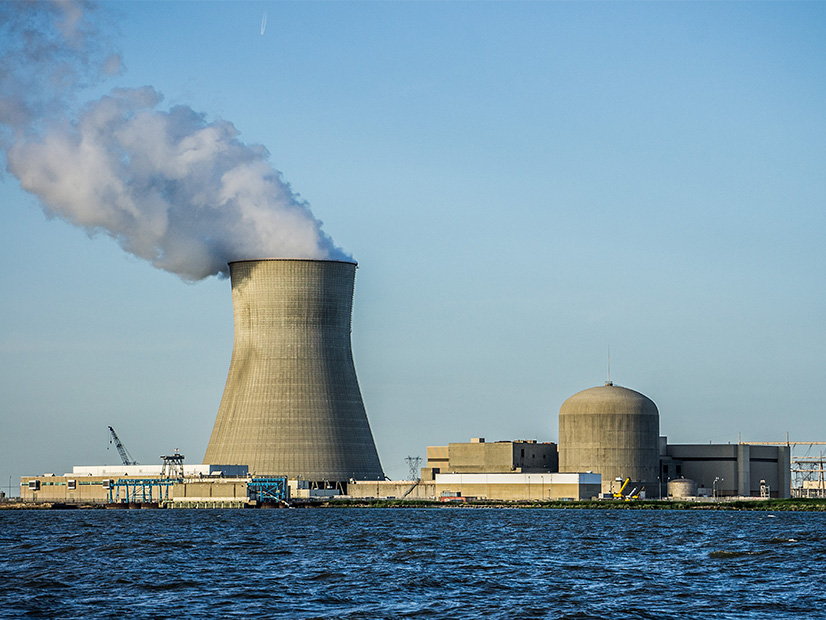
Public Service Enterprise Group is looking to use excess capacity at its three South Jersey nuclear generators to provide clean energy for data centers and artificial intelligence development projects that could be sited in the state in the future, CEO Ralph LaRossa said in the company’s first-quarter earnings call April 30.
The proposal is part of the company’s ongoing effort to “pursue potential investment opportunities for future regulated growth,” LaRossa said. Other possibilities include doing work to upgrade the state’s transmission lines in preparation for offshore wind energy, he said.
PSEG is the majority co-owner of Salem Generating Station Units 1 and 2, with Constellation Energy, and is the sole owner and operator of the Hope Creek plant. It recently informed the Nuclear Regulatory Commission that it intends to seek operating license extensions that would add an additional 20 years to the plants’ life. (See PSEG Plans for 80-year Nuclear Generation in NJ.)
LaRossa said the nuclear fleet is “pursuing multiple growth paths with modest capital spending needs” and that thermal upgrades planned for one of the Salem units “could potentially add up to 100 MW of additional capacity.” That capacity could “qualify for clean hydrogen tax credits,” he said, created by the Inflation Reduction Act that in some circumstances can be awarded to nuclear plants that produce hydrogen.
“Beyond these opportunities in nuclear, there has been discussion lately about the potential for direct power sales to data centers from our three-unit Artificial Island site,” he said, referring to where the nuclear plants are located. At present, the site has additional space available.
“We’ve had discussions related to both sides of the meter in recent months,” LaRossa said. They have included “new business inquiries at PSEG for midsized data center construction of approximately 50 to 100 MW and behind-the-meter inquiries for co-located facilities that prioritize highly reliable, carbon-free baseload power from existing facilities, all without the challenges faced by non-dispatchable generation,” such as wind and solar.
“This data center opportunity has the potential to create a nexus between economic development and [state] energy policy,” LaRossa said.
Offshore Infrastructure
In a separate issue, LaRossa said the company is still waiting for guidance from the U.S. Treasury on how it can apply for production tax credits, also available under the IRA, to support the three nuclear plants.
PSEG and Constellation in November withdrew from New Jersey’s Zero Emission Certificate (ZEC) program, which had awarded subsidies of $300 million a year since 2019 to keep the plants open. PSEG said it would instead focus on seeking federal tax credits.
The companies’ withdrawal from the program has effectively shut it down, with the Board of Public Utilities approving an order in February that will end the fees customers have paid to fund the subsidies. (See NJ Closes Nuclear Subsidy Process as PSEG Looks to Feds.)
The three plants generated 42% of the electricity produced in the state in 2022 and are key to Gov. Phil Murphy’s goal of reaching 100% clean energy by 2035. In addition, Murphy has outlined plans to create an AI hub at Princeton University, and on April 11, he spoke at the state’s first AI Summit.
LaRossa said that as part of the company’s search for “competitive transmission solicitations in the Mid-Atlantic region,” it submitted bids in April to the BPU’s “pre-build infrastructure solicitation, for which the selected projects are expected to be announced in the second half of 2024. The solicitation is designed to award projects that can connect offshore wind farms to the grid through the onshore infrastructure approved in October 2022. (See NJ BPU OKs $1.07B OSW Transmission Expansion.)
In addition, PSEG is evaluating a possible bid for New Jersey’s second solicitation for offshore transmission infrastructure under the second State Agreement Approach with PJM, he said. The company is looking to participate in “PJM’s 2024 Regional Transmission Expansion Plan Window One solicitation, which is expected to include the impacts of higher load growth forecasts that have been influenced by increased electrification expectations and data center load growth throughout PJM.”
PSEG’s first-quarter results for 2024 fell short of those in 2023. The company reported net income of $532 million ($1.06/share), compared with $1.287 billion ($2.58/share). Non-GAAP operating earnings for 2024 were $657 million ($1.31/share), compared with $695 million ($1.39/share) in the same period in 2023.


